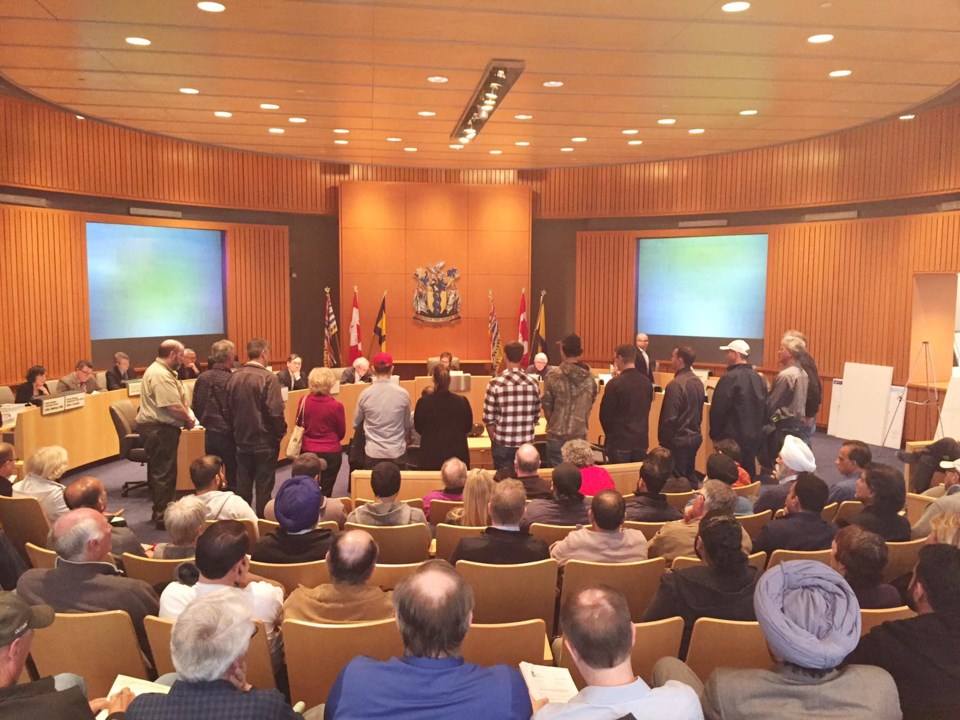If they claim their voices weren’t heard during the process, they certainly made up for it at city council Wednesday night.
Such was the surge on city hall from Richmond’s farming community, that the planning committee meeting had to slide downstairs, to city council chambers, to accommodate around 120 people.
Most of them had converged on city HQ to protest a city staff recommendation to restrict the size of residences on Richmond farmland to 5,382 square-feet — a move prompted by city council earlier this year to stem the proliferation of mega homes on farmland.
And many of them seized the opportunity to vocalize their disgust, plea with council and, through Richmond Farmers Institute (RFI) president Todd May, express disbelief at how city staff had informed the farming community not to take part in a community-wide survey on the issue.
What it all added up to was a near, five-hour long meeting, ending with what the majority of the planning committee — including Mayor Malcolm Brodie — deem a “compromise.”
After much discussion among city councillors — including an unsuccessful motion from Coun. Bill McNulty to refer the matter back to staff for more consideration — Brodie successfully tabled an amendment for house size limits to be doubled to 1,000 square metres (10,764 square feet) if the land it’s being built on is at least half an acre in size.
Anything less than half an acre would be subject to the original staff recommendation of 500 square metres (5,382 square feet).
“It’s a balancing act,” Brodie told the Richmond News.
“There are those that want to minimize (the house sizes) and those that want no regulations at all.”
Brodie said he made the motion to resolve the issue, even though council placed a moratorium on such development applications last month.
“If an application comes in after the moratorium, the city only has 30 days in which to decide if the application is commensurate with any new bylaw,” Brodie explained.
As well as amending the house size limit, city staff were directed by the committee to modify criteria under which applicants could apply for rezoning, if they want something bigger than the 1,000-square metre limit.
The bylaw amendments passed with a 4-2 majority, with Couns. Harold Steves and Alexa Loo voting against – Steves wanted lower building heights. Loo opposed the 500-square metre limit, and instead suggested a 1,000-square metre limit for properties under 20 acres and a 1,500-square metre limit for 20 acres or more.
The amendments still need to be approved at a full city council meeting next week before going to a public hearing, possibly in May.
Before Brodie’s motion and the committee vote, RFI president Todd May, flanked by a 12-strong delegation, made an impassioned plea to city council.
He claimed a large section of the farming community had been “omitted and ignored” by city staff in the preparation of their report.
“We were told we were to be key stakeholders in the process and we were told, quite clearly, that the survey wasn’t to be filled in by us, because our views would be given significant importance and weight on the impact of this...there seems to be a lot of weight placed on this survey.”
Directing council’s eyes towards the crest on the wall behind them and referring to the 1879 incorporation, he said his members’ founding relations were here long before that.
“There is a century and a half of contribution to Richmond in front of you. We recognize that there is an issue with house sizes... but set it at 1,000 square metres.”
Other farmers told of how they are continuing the work of their parents and grandparents and don’t want the ability to pass on their heritage to their own children hampered by a restriction on house sizes.
Not everyone backed the farmers, though.
Michelle Li said all the city needs to do is follow the current ALC guidelines and “stop pitting cultures against each other.”
Adding that she, too, wishes she could build a larger home on her urban lot to accommodate her family, but she can’t.
City staff’s recommendation that an accessory, residential building on the property be limited to 753 square feet was approved.
Last month, a near unanimous Richmond city council placed a moratorium on building permit applications for houses on protected farmland, following a recent flood of such applications to build large houses on the ALR.
In January, when council began a public consultation process on restricting home sizes on farmland, Couns. Carol Day and Harold Steves called for a moratorium, fearing a rush of development. Since then, there has, indeed, been a deluge, with the average size of application at almost 13,000 square-feet; one proponent asked for 32,660 square-feet.
Until now, Richmond was one of the few Metro Vancouver municipalities not to have any kind of effective restriction.



